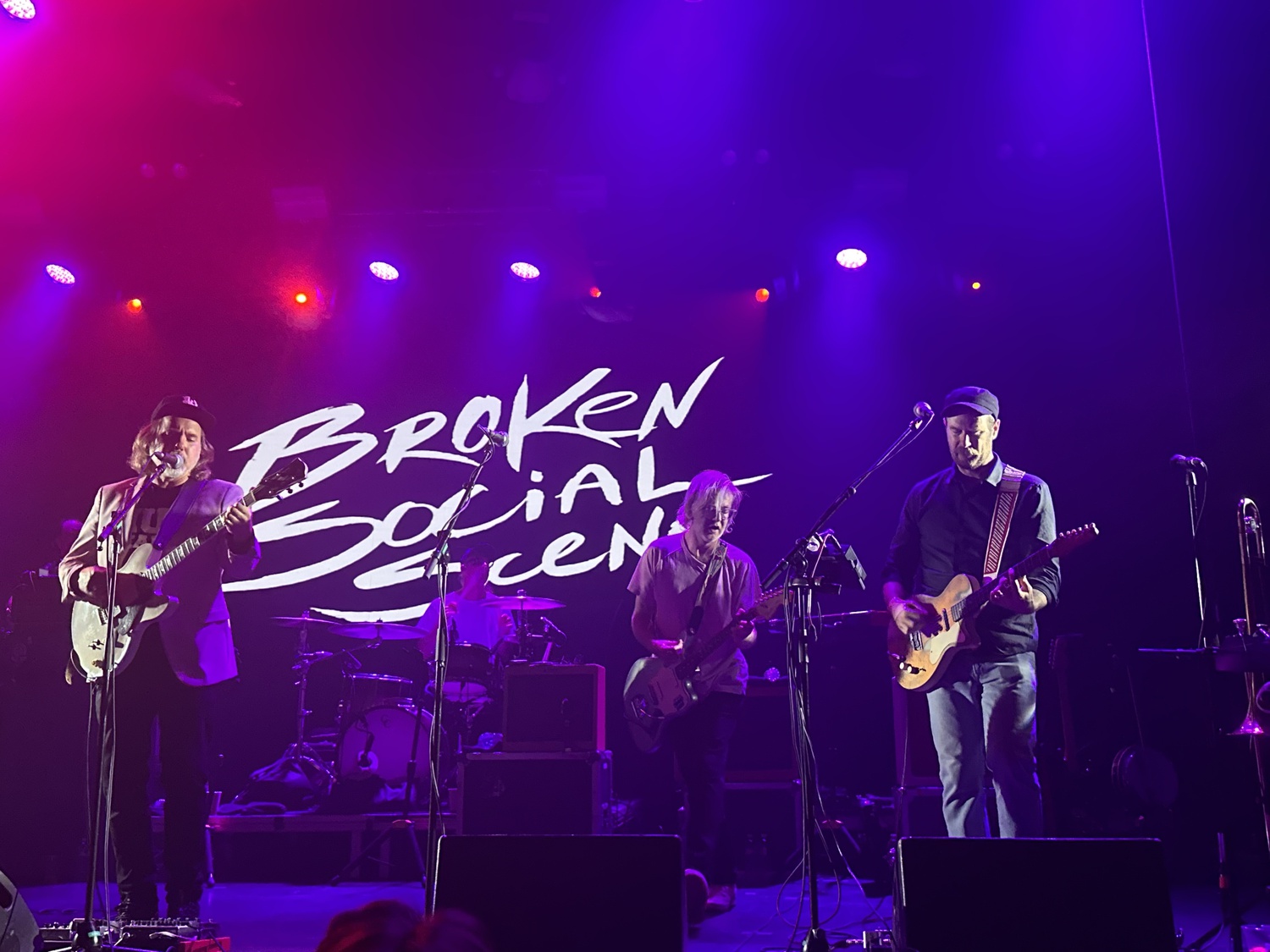
News
Summers Will Not Finish Semester of Teaching as Harvard Investigates Epstein Ties

News
Harvard College Students Report Favoring Divestment from Israel in HUA Survey

News
‘He Should Resign’: Harvard Undergrads Take Hard Line Against Summers Over Epstein Scandal

News
Harvard To Launch New Investigation Into Epstein’s Ties to Summers, Other University Affiliates

News
Harvard Students To Vote on Divestment From Israel in Inaugural HUA Election Survey
Concert Review: Broken Social Scene Find Joy in the Chaos

Broken Social Scene is motion.
During their opening song, “KC Accidental,” guitarists Andrew Whiteman and Brendan Canning faced off with one another, strumming and swinging their guitars in the air as they skirted from side to side, then touching backs and twirling in a circle. Halfway through the song, guitarists Evan Cranley and Charles Spearin swapped their guitars for a saxophone and trombone. Justin Peroff, on drums, was the only figure stationary on stage. The group’s choreography resembled a wave breaking and receding. As a musician would step to the front of the stage to deliver a guitar riff or solo, the rest of the band would drift backwards, out of the spotlight. This chaotic movement created an atmosphere that was at once frantic and cathartic, making the more stripped-down moments of the set all the more satisfying.
One such moment took place when the stage emptied completely except for Kevin Drew — one of the cofounders of Broken Social Scene — who took his place at the keyboard to sing “Lover’s Spit,” a yearning, solemn ballad about the messiness of intimacy. As the song crescendoed, Drew’s bandmates rejoined him on stage, adding the depth of their instruments and voices. This progression embodies the bands’ blossoming over time, from Drew and Canning’s two-man, ambient-focused project to the richly layered sound of the collective today.
Midway through the song, Drew bounded to center stage, his scraggly hair peering out of his baseball cap, as he delivered his first words of the night: “Yo.” Drew is the collective’s closest thing to a frontman, although his role is more like that of a conductor: He helps corral the commotion and distill some meaning from what might otherwise seem like an overwhelming amount of fanfare and incongruous moving parts.
Broken Social Scene is an ambitious project, especially since the group’s lineup, which can swell up to 19 musicians strong, is also engaged in other musical projects, including Feist, Stars, Metric, and Apostle of Hustle. Since Drew and Canning — both Ontario natives — formed the indie-rock collective in 1999, it has remained an amorphous organism.
When Drew asked, “Who was here last night?” a wave of “woos” erupted from the crowd. “We’re here to celebrate you,” he said. “Give it up for yourselves. It’s all about having fun and being here as a community.”
The show was the second night Broken Social Scene performed at Royale in Boston in celebration of the 20th anniversary of their critically-acclaimed album, “You Forgot It In People.”
Vocalist Jill Harris proved to be a unifying force on stage, her clear soprano voice delivering lyrics with clarity and force. During “Sweetest Kill,” a droning, introspective love song, she echoed the end of each verse, her voice reverberating through the venue. Harris’s consistent tone held together the distinct personalities on stage, ensuring the sonic balance of the set.
While the set remained uplifting, it did not shy away from melancholy. During one interlude, Drew paid homage to Scott Hutchison, the lead singer and songwriter of Frightened Rabbit, who opened for Broken Social Scene at their last show in Boston in 2017. Less than seven months later, Hutchison took his own life at age 36. “It's all emotional… it’s very fucking vulnerable,” Drew admitted.
In a testament to the band’s collaborative ethos, Drew invited opening act Hannah Georgas back on stage to perform fan-favorite, “Anthems for a Seventeen Year-Old Girl.” Georgas and Harris both clutched their mics, crouching slightly as their voices mingled in a breathy, hypnotic refrain: “Park that car, drop that phone, sleep on the floor, dream about me.” With each repetition, the audience grew louder, and the two voices receded, becoming the backing track to a song that belonged to everyone in the room.
This seemed a natural conclusion to the set, but Drew had other plans. The night before, he had run into a fan who had requested the song, “I’m Still Your F*g.” “It doesn’t really fit into the set,” Drew admitted, “but we’re going to play it anyway.” The song, a moody, insecure ballad about a clumsy romantic encounter was a strange, destabilizing ending to an otherwise cohesive set. The choice to include the song demonstrated the band’s commitment to community over all else, even if it meant being a little messy.
Drew’s engagement with the audience defined the show. About half-way through the set, he retrieved a signed Kellogg’s Frosted Flakes box from backstage and offered it to a fan. “We don't endorse anything,” Drew clarified, “except love, freedom.… Well actually freedom is a weird word nowadays.” Another fan proudly showed off a tattoo on his forearm, which was a drawing of Drew’s.
The band uses the chaos of interconnectedness as a force to propel them forward. Over the course of the show, through banter and earnest confessions, the distinction between audience and performer melted away. As Drew pointed to individual members in the crowd, smiling and nodding his head, the message he was sending was clear: “I see you.”
Want to keep up with breaking news? Subscribe to our email newsletter.
